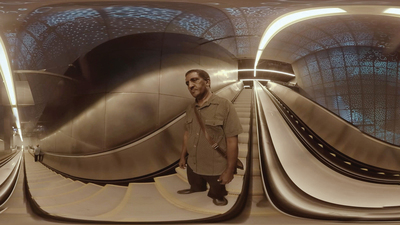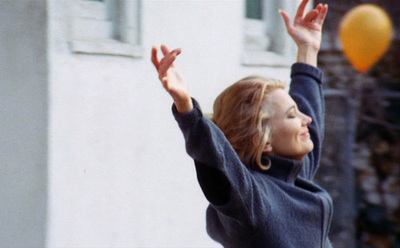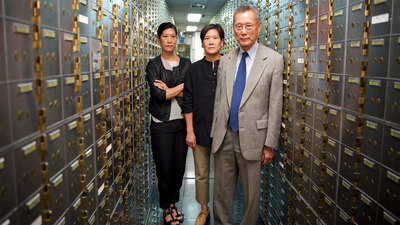
BY MATTHEW ENG |
Tribeca 2017 Director Spotlight: Brian D. Shoaf Talks AARDVARK, Kieślowski, and What's Next
Brian D. Shoaf explains how his Tribeca-selected oddity came to the screen.
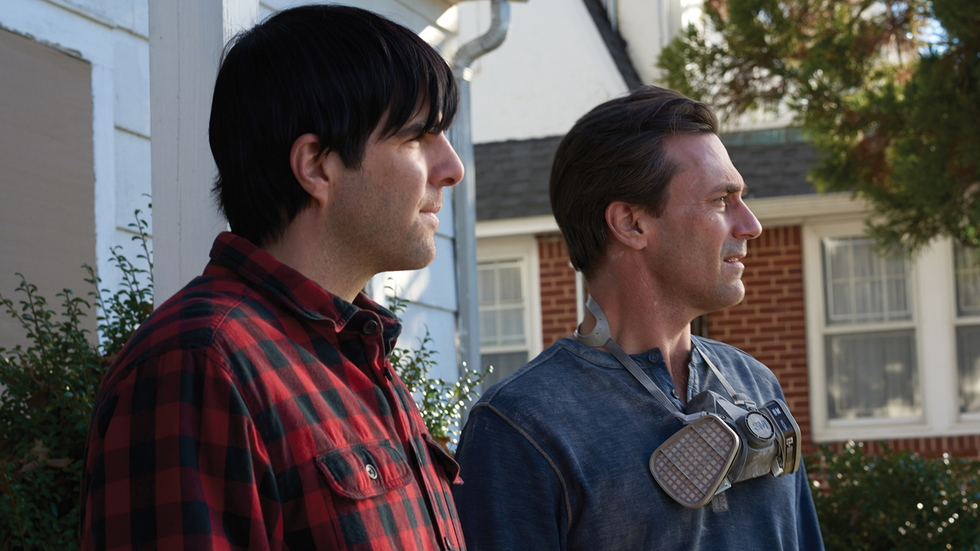
In writer-director Brian D. Shoaf’s Aardvark, which played in the U.S. Narrative Competition at the 2017 Tribeca Film Festival, Zachary Quinto stars as Josh, an unhinged layabout who is convinced the people around him are played by his actor brother Craig (Jon Hamm), whose seemingly chameleonic gifts have been wasted in the service of a long-running police procedural. Throw into the mix a flustered therapist (Jenny Slate), who soon becomes entangled in this peculiar sibling bond, and an enticing love interest (Sheila Vand), who may or may not be Josh’s brother, and Aardvark would have all the necessary components for a screwy, gag-laden farce in the vein of early, pre-prestige David O. Russell. But Aardvark, which marks Shoaf’s feature directorial debut, distinguishes itself by veering away from this broader track, opting instead for a more intimate and interesting narrative that’s defined, in equal parts, by its unassuming strangeness and unexpected sensitivity.
I talked to Shoaf before the film’s world premiere at Tribeca this past month about the story’s origins, his consummate cast, and the masterful Polish auteur who remains his biggest inspiration.
Aardvark tells such a peculiar and distinctive story that I’m curious not only about its origins but also how personal it might be for you.
I can say that there’s very little autobiographical content, which is probably for the best. I think that it sort of became more personal as it went along. My initial idea was for something more abstract about the two brothers, one of whom is actually really the world’s greatest actor — like Daniel Day-Lewis meets Meryl Streep meets whoever — and can assume characters so completely that even his own brother doesn’t know it’s him. And there would be this ongoing prank where [the other] brother is communicating with someone and it would be the [actor] brother all along. The kind of twist would be that he falls in love and then really hopes he’s not falling in love with his brother. That would have been an even more niche version of this.
But I wanted something that would provide an easier way in for a wider audience. And that’s when the idea [originated] that Josh may have actually had this break in his life and been diagnosed with a serious mental condition, meaning that the hallucinations were hallucinations. And his brother’s status as a great actor is something that he has only built up in his own head, when, in fact, his brother is an actor but not one of the great talents of his generations. He’s more of a guy who just got very lucky and wound up on a TV show that ran for 12 years and maybe made a lot of money but isn’t actually, in fact, somebody they’re going to be writing biographies of someday. And all of that plays into their relationship so that, in the end, it would really boil down to the estrangement between them and a need, on both their parts, to overcome that for their different reasons.
In a sense, Emily becomes the character who enters the process later and it was very, very important to me that she not just be there in a more predictable movie therapist role. I didn’t want her to be there just for the other guy to bounce ideas off of. I wanted it to feel like if you took Josh and Craig out of the movie, you could still have a movie about Emily. So I tried to make sure that she got full weight and time as far as the story is concerned. And it’s been very interesting to me, the ways in which people see this story. Sometimes it’s about a therapist and her challenging patient and his brother. Other times, people say it’s about two brothers and the therapist who helps them reconnect in a very bizarre way. There’s a mirror-image quality to it, in that way.
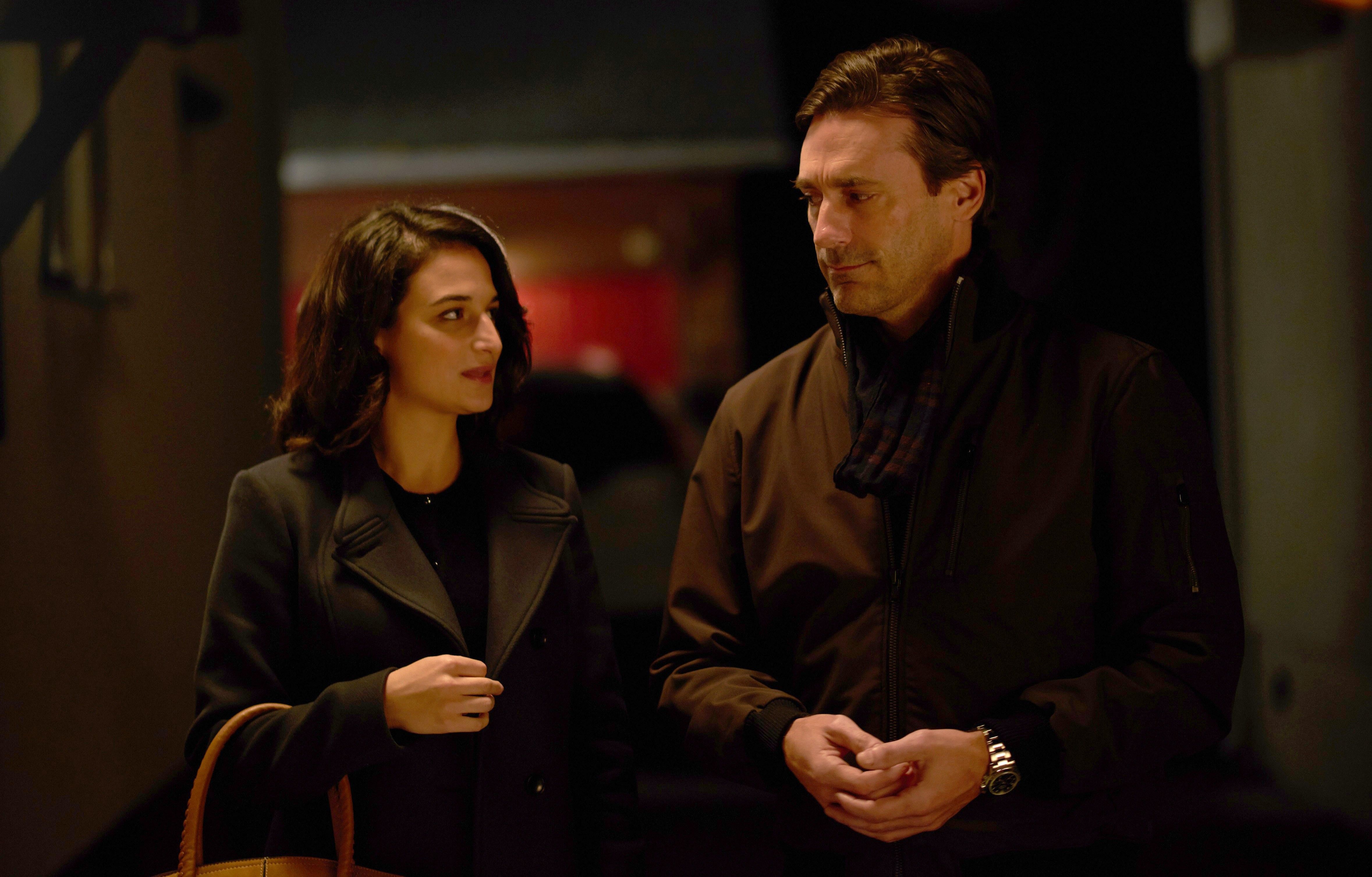
You’ve gathered together such an ideal cast for this, including Zachary Quinto, Jenny Slate, and Jon Hamm. All of them feel very thoughtfully cast, either because we’ve rarely seen them play this type of role, in Zachary or Jenny’s case, or because the part seems to serve as something of a sly commentary on their own star persona, in Jon’s case.
Having Jon play that role is beyond good fortune. And there are a lot of actors in the world, but for him to have gotten the script and responded to it in that particular moment in time and agreed to be a part of it does feel really special. I don’t know the exact date that he finished Mad Men but it was still within a year of us shooting. He was still winning awards for playing Don Draper after we had wrapped. So we didn’t just have a huge TV star coming to play a huge TV star but there’s this notion of [Hamm] letting go of this thing that had defined him and looking ahead and maybe asking, “What now?” Although I think Jon seems to have a much better idea of what to do next than Craig did. At one point we were looking for old pictures of Jon Hamm because we wanted stuff from Craig’s past and it really does seem that there is a universe where [the character’s] career could have been [Hamm’s]. He was on three seasons of a Lifetime cop show [The Division] that I’d never even heard of. And he did sixty or so episodes of this cop show on Lifetime, where he was fifth-billed and then Taraji P. Henson was sixth-billed. So, he could have completely gone down this road where actors go on these shows that run for a long time, make a lot of money, and become a celebrity at some level, but not winning Golden Globes or being Jon Hamm.
As far as Zach’s involvement, he was one of our three producers on the film and was very much involved. He read the script and said, “I’m going to produce this,” and then got [producer] Neal [Dodson] involved and then they brought Susan Leber along. He really spearheaded [the film] and probably felt the same way [as Jon], which is that this is a very different thing for [him] to be doing. And were it not for his determination to see [the film] through, I don't think we would have done it. He was just absolutely instrumental in that.
And we were hugely fortunate with Jenny. She was someone who Zach knew and was able to reach out to, personally. And she responded very fast and very passionately. It was just very exciting. I think the role is very different for her. I had seen her do a lot of stuff and thought, Oh, this person is so immensely talented, she can probably do anything. But I don’t know if I even appreciated the extent to which she pushed herself. It was still unusual for her to be doing a role where, at no point, did we say, “Now just be hilarious!” Even in Obvious Child, which has all this pathos and emotion, she’s playing a comedian. There’s still the expectation that she’ll make us laugh. And even though she makes us laugh in Aardvark, there’s no point where it becomes “The Jenny Slate Comedy Hour.”
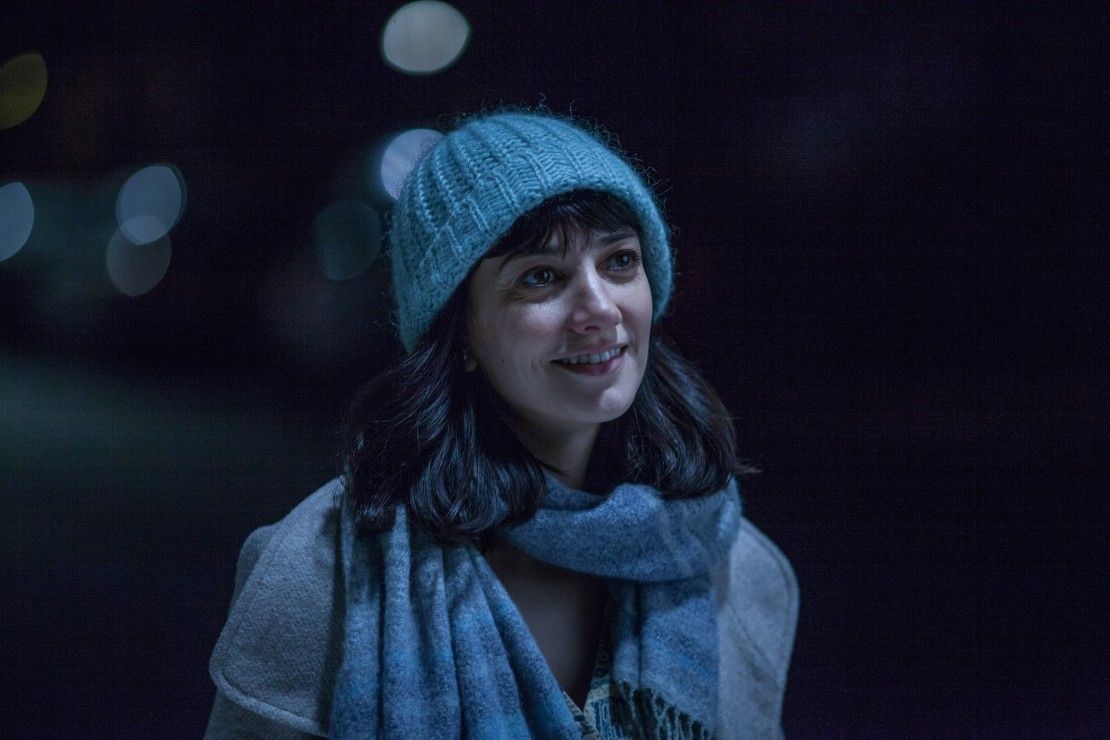
I was also drawn to Sheila Vand, who was so striking in Ana Lily Amirpour’s A Girl Walks Home Alone at Night and is so soulful as a very different sort of character here.
Zach, Neal, and I went to college together at Carnegie Mellon University quite a long time ago. After that, I got a graduate degree in playwriting from UCLA. And while I was there, Sheila was also there as an undergrad in their acting program. We met, I guess, or interacted in some capacity. I think we had a couple of classes together but we didn’t really know each other. But I had seen her classwork and thought she was fantastic. And then, very soon after she graduated, I remember seeing her name pop up in trades and that wasn’t really hugely surprising, that she would have a career. But she just came in and auditioned [for Aardvark]. She had just moved to New York from L.A. and our casting directors were really excited to show her. And as soon as she walked in — I think she was maybe the first to read for that role — I kind of felt like I knew where this was going. A lot comes full circle and you go, Alright, this is meant to be. I don’t know how you know, instinctively, how to be alluring but it felt very natural for her. [Laughs]
Aardvark marks your feature narrative debut as a director, but you’ve worked in the entertainment industry for a while now as a director, writer, actor, and producer, among other roles. How did your experiences both behind and in front of the camera prepare you for this project?
On a very practical level, I was very fortunate to have worked with very talented friends who have a lot of professional experience. Even when we were just shooting stuff and screwing around with a camera, I was always the one who was learning from them. And it was great for me [on Aardvark] to have that experience before making this professional, union feature that requires prep. I had never worked with a first AD before. I had never worked with a monitor before. So there’s all this new stuff, but I felt like I was able to look back at things that I had basically been fortunate to learn from friends and see how they all line up. And it felt familiar.
The other aspect of it is that I had a long period in the wilderness during my twenties where I didn’t necessarily know what I was doing. And that’s when I was trying to write plays and maybe, sort of act, while never being really sure of it, which is a tough way to act because it requires a huge amount of determination. By the time I came around to writing this script, I absolutely wrote it with the intention that I was going to make it myself. I would play any role I had to play in order to get this done. I was gonna see it through. And it took about five years. By the time that I made that choice, I think the maturity that came from being kicked around was as helpful anything. I knew to appreciate all these new experiences and soak them in as moments as they happened. The best guard against being overwhelmed or freaked out on set is to tell yourself, “This is a really special experience and it’s never gonna happen again,” at least when it comes to the first film. I just really tried to enjoy it and take it in.

You’ve talked before about being inspired at a very young age by the films of Krzysztof Kieślowski. It’s not an influence I would have immediately assumed just from hearing the premise of Aardvark. But after actually watching it, I can definitely see a similar attempt at furnishing this very subjective but also deeply sensory cinematic experience that Kieślowski always excelled at creating. In what other ways has Kieślowski impacted your work?
To some extent, directing a feature for the first time feels, in retrospect, like when you hear a band’s first album and realize, “Every good song saved up for 15 years must be in this album. What are they gonna do on the second one?” I feel like the Kieślowski influence goes so far and deep for me, but it kind of plays into that idea that you’re never gonna come this way again and if you want to try something, go for it. But when I first encountered those movies, I was still in high school and I didn’t necessarily think I was ever going to direct anything. I was much more keyed into writing, and not even necessarily screenwriting, but maybe fiction or plays. It’s funny because Kieślowski is such an immense talent as a director, visually. That’s how he’s known. But he wrote almost all his screenplays with a writing partner [Krzysztof Piesiewicz] and I was just so wrapped up in how he was able to take ordinary objects and make them feel unusual. And I don’t think it was purely visual because he always had a character at the center of it who is sort of feeling the same way. His characters wonder, Why does everything suddenly feel out of place? Why am I walking around in this weird world that doesn’t feel the way it’s supposed to feel? He structured his stories in such a way that you were progressing along with that character and through their point of view, and I think really rooting for that character to figure it out. And [Kieślowski] didn’t necessarily have to create a big crisis to make us feel that something is off. But through the way he structured stories, he was able to build that experience into something really big.
For me, [Slate’s character] Emily feel likes the Kieślowski character. She’s the one for whom everything seems just a little bit out of whack and out of place. And she can’t figure out why. For Josh, he at least has an explanation because it’s something he’s been dealing with for a long time. I think when she feels her life become unmoored, she can’t quite put her finger on it and then she starts to take more and more desperate action to reengage. But even physically, I wanted Jenny to literally look like Irène Jacob does in The Double Life of Veronique or Three Colors: Red with the heels, stockings, and skirts because it feeds into her character and it feels like she wants to dress the part. But there’s a moment when Jenny moves the boxes in front of her door on the driveway. I was very proud of that moment because it felt to me like something one of those characters would do: to be in heels and try to pick up four cardboard boxes using your chin. It’s those teeny-tiny things that resonate with me.
What else has influenced you?
I have found, particularly as a writer, it’s always sort of the last thing you saw. At some point [during production], I actually tried to stop watching things that I felt would be hard to get out of my mind.
I really wanted there to be a contrast between day and night in the movie. You don’t even see [Vand’s character] Hannah during the day, until very late in the story. Josh occupies this nocturnal world that belong to him, even though he goes back and forth to the daylight during his meetings with Emily. I was looking at films where daylight is used particularly well indoors. David O. Russell does beautiful things with light, where it just streams through open windows. And Darren Aronofsky’s The Wrestler was a great movie to learn from when it came to shooting in the dark. In those scenes with Josh and Hannah, I wanted it to get very dark at points and not have to worry about whether or not you could see them.
As someone just beginning to delve into feature directorial work, what sort of stories are you interested in bringing to the screen?
One of the advantages of this film taking four or five years to see through is that this script presented a new way of writing for me. And I wanted to try it again. So I actually stockpiled a few scripts that I felt really had a lot of promise while waiting for Aardvark to happen. I tried to write at least a script a year. I have four or five that I feel I could push out into the world. And a couple of them are moving forward in baby steps. It’s hard to put a finger on [the types of stories I want to tell], but the most important thing that any movie can do is surprise you. I almost don’t care what the surprise is, so long as it’s genuine. It could be that I think I’m seeing a piece of garbage and it turns out to be good. That can be a great surprise. Or you could go see something that you think might be very cold, austere, and artsy and it turns out that it has a lot of heart and is very visceral in some way.
I think that the stories that I’m hoping to put out there are maybe gonna fall into one category, in terms of how they’re perceived, and then hopefully upend expectations in that way. Zach and I are working on another script that I would love for him to be in and that I think he wants to do as well. It’s a drama dealing with some political issues and could be very somber. But I think it would be more interesting to make it beautiful and optimistic, as opposed to something that beats people over the head for 90 minutes. I’m also working on another script that’s a romantic comedy about a mixed-martial arts fighter. Trying to keep both of those audiences happy would be a trick, you know? I’d love for people who came for the romance to be surprised by how much they’re rooting for the fight, and vice versa. That’s my hope — to not fight against genres for any arbitrary reason but also give people more than they bargained for.
